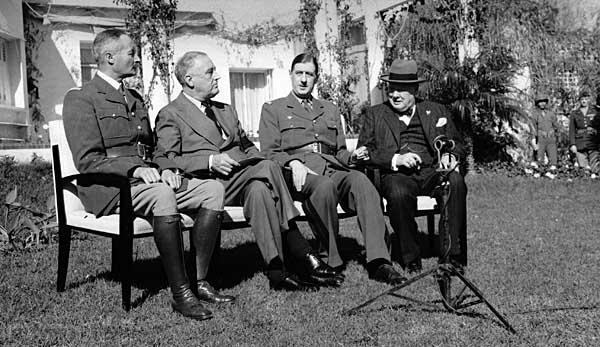Casablanca Conference
United Kingdom-United States 【1943】
 (January 12–23, 1943), meeting during World War II in Casablanca, Morocco, between U.S. President Franklin D. Roosevelt (Roosevelt, Franklin D.) and British Prime Minister Winston Churchill (Churchill, Sir Winston) and their respective military chiefs and aides, who planned future global military strategy for the western Allies. Though invited, Soviet leader Joseph Stalin (Stalin, Joseph) declined to attend.
(January 12–23, 1943), meeting during World War II in Casablanca, Morocco, between U.S. President Franklin D. Roosevelt (Roosevelt, Franklin D.) and British Prime Minister Winston Churchill (Churchill, Sir Winston) and their respective military chiefs and aides, who planned future global military strategy for the western Allies. Though invited, Soviet leader Joseph Stalin (Stalin, Joseph) declined to attend.The work of the conference was primarily military—deciding on the invasion of Sicily (after completion of the North African campaign) rather than an immediate invasion of western Europe, apportioning forces for the Pacific theatre and outlining major lines of attack in the Far East, and agreeing on the concentrated bombing of Germany. Roosevelt and Churchill also found time to discuss nuclear bomb research, to consider competing claims between Henri Giraud (Giraud, Henri) and Charles de Gaulle (Gaulle, Charles de) for the leadership of the French war effort against the Axis powers, and, most important of all, to demand an “unconditional surrender” from Germany, Italy, and Japan.
Both the announcement and the policy of unconditional surrender were severely criticized after the war, when it was contended that opposition groups in Germany might have overthrown Adolf Hitler (Hitler, Adolf) and negotiated an earlier peace if the German military had not been alarmed and galvanized by the prospect of Allied vindictiveness. Churchill's reply was that any statement of terms acceptable at that time to Allied leaders and to their peoples—such as the partition of Germany, its complete demilitarization, and reparations in kind and in forced labour—would not have been acceptable to German leaders. In Japan, unconditional surrender may also have complicated termination of the Pacific War. This is a debate that lives to this day.
- dance suite
- dance, Western
- Dancourt, Florent Carton
- Dandakaranya
- Dandarah
- dandelion
- Dandenong Ranges
- Dandie Dinmont terrier
- Dandolo, Enrico
- Dandolo Family
- Dandolo, Vincenzo
- Dandong
- Dandridge, Dorothy
- Dandridge, Ray
- dandruff
- Danegeld
- Danelaw
- Danewirk
- Dan Flavin
- Dan Gable
- Dangerfield, Thomas
- Dangriga
- Daniachew Worku
- Danian Stage
- Danie Craven